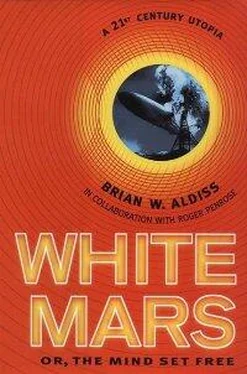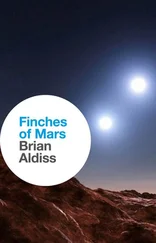Brian Aldiss - White Mars
Здесь есть возможность читать онлайн «Brian Aldiss - White Mars» весь текст электронной книги совершенно бесплатно (целиком полную версию без сокращений). В некоторых случаях можно слушать аудио, скачать через торрент в формате fb2 и присутствует краткое содержание. Год выпуска: 1999, ISBN: 1999, Издательство: Little, Brown UK, Жанр: Фантастика и фэнтези, на английском языке. Описание произведения, (предисловие) а так же отзывы посетителей доступны на портале библиотеки ЛибКат.
- Название:White Mars
- Автор:
- Издательство:Little, Brown UK
- Жанр:
- Год:1999
- ISBN:0-316-85243-0
- Рейтинг книги:5 / 5. Голосов: 1
-
Избранное:Добавить в избранное
- Отзывы:
-
Ваша оценка:
- 100
- 1
- 2
- 3
- 4
- 5
White Mars: краткое содержание, описание и аннотация
Предлагаем к чтению аннотацию, описание, краткое содержание или предисловие (зависит от того, что написал сам автор книги «White Mars»). Если вы не нашли необходимую информацию о книге — напишите в комментариях, мы постараемся отыскать её.
White Mars — читать онлайн бесплатно полную книгу (весь текст) целиком
Ниже представлен текст книги, разбитый по страницам. Система сохранения места последней прочитанной страницы, позволяет с удобством читать онлайн бесплатно книгу «White Mars», без необходимости каждый раз заново искать на чём Вы остановились. Поставьте закладку, и сможете в любой момент перейти на страницу, на которой закончили чтение.
Интервал:
Закладка:
We shook hands. Our listeners applauded briefly.
Crispin Barcunda was present with Belle Rivers. She was looking younger and dressing differently, although she still strung herself about with rock crystal beads. It was noticeable how affectionately she and Crispin regarded each other.
“Well, well, Tom Jefferies, you will turn us yet into a pack of coenobitic monks,” Crispin said, in his usual jocular fashion. “But your declaration of Utopia, or whatever you call it, must not be padded out with your prejudices. If you recall the passage I quoted, to the benefit of everyone, from the good Alfred Wallace’s Malay Archipelago, he states that a natural sense of justice seems to be inherent in every man.
“That may not be quite the case. Perhaps it was stated merely in the fire of Victorian optimism—a fire that has long since burned itself out. However, Belle and I believe that a natural sense of religion is inherent in every man. Sometimes it’s unrealised until trouble comes. Then people start believing all over again in the power of prayer.
“The little nondenominational church we set up has been well attended ever since we learned about Olympus—Chimborazo, I mean—and its movements.
“We are well aware that you are against religion and the concept of God. However, our teaching experience convinces us that religion is an evolutionary instinct, and should be allowed in your Utopia—to which we are otherwise prepared to subscribe. We need you, as chief law-giver, to realise there must be laws that go against your wishes, as there will be some laws contrary to everyone’s wishes. Otherwise there will be no reality, and the laws will fail.”
Belle now turned the power of her regard on me and reinforced what Crispin had said. Tom, our children need guidance on religion, as they do on sex and other matters. It’s useless to deny something exists just because you don’t like it, as we once denied there was life on Mars because it made us feel a bit safer. You have seen and heard the kids with their tammies—a nuisance to us maybe, but seemingly necessary to them. You must listen too to the squeaks of the godly.
“If we are to live rational lives, then we must accept that there are certain existential matters beyond our understanding—for the present at least, and maybe always and for ever.
“It is certainly no perversion to feel a reverence for life, for the miracle of it, for the world and for the universe. Doesn’t the discovery of Chimborazo increase our wonder? Into such reverence the idea of God slips easily. Our minds are not quantputers. They work in contradictory ways at one and the same time. It’s for this reason we sometimes seem at odds with ourselves.”
While listening intently I nevertheless noticed at this moment a fleeting smile on the face of Poulsen, who had sat motionless, not shifting his position, making no comment.
Belle was continuing. “Those most vehement against established religion are often proved to be those most attracted to its comforts. We exist at the heart of a complexity for which any human laws we promulgate must seem flimsy, even transitory.
“There was a time when it was bold to take up an anti-religious stance. That time is past. Now we see that religion has played an integral role in our evolution. It has been a worldwide phenomenon for many centuries, and—”
At which point Dayo broke in, sawing the air with one hand, saying, “Look, Missis Belle, slavery too was a worldwide phenomenon for many centuries. It still exists Downstairs! Millions of people were snatched from West Africa to serve the white races in the New World—twenty-five million people snatched from East Africa by Islamic traders in one century alone. I have the figures!
“Slavery isn’t done away with yet. Always it’s the rich and powerful against the poor and powerless! That doesn’t mean to say we don’t need to banish slavery—or religion. Or that these terrible things are good, just because they’re old, does it? Antiquity is no excuse. We’re trying to reform these horrible blemishes on existence.”
Dayo received a round of applause. A look of delight filled his face. He could not stop beaming.
Belle gave Dayo a nod and a tigerish smile, while seeming to continue her monologue uninterruptedly.
“Life for all generations, more particularly in the dim and distant past, has been filled with injustice, fear, injury, illness and death. God is a consolation, a mediator, a judge, a stern father, a supreme power, ordering what seems like disorder. For many, God—or the gods—are a daily necessity, an extra dimension.
“We like, in our Christian inheritance, to think that God made us in His image. It’s more certain that we made Him in our image.
“And where does that image live? Beyond matrix, beyond time, beyond space-time. Was it intuition that dreamed up such a place, which scientists now believe might exist?”
“You make,” I replied, “religion sound like a unitary matter. In its many sects, in fact, it has proved divisive throughout Earth’s history, a perennial cause of war and bloodshed.”
“But we are creating Mars’s history now,” said Crispin, smiling and allowing a glimpse of his gold tooth, while Belle, scowling radiantly, said, “Tom, let me quote a phrase Oliver Cromwell once used: ‘I beseech you, in the bowels of Christ, think it possible you may be mistaken!’”
I let myself be persuaded by their eloquence. “As long as you don’t start sacrificing goats,” I said.
“Heavens,” Crispin said. “Just show me a Martian goat!”
The discussion then turned to other subjects, on which agreement was reached with unique ease, and—with everyone’s assistance—Adminex accordingly drew up and put on record our laws.
As Arnold Poulsen was about to depart as silently as he had come, I caught his sleeve and asked him what he made of the debate.
“Despite wide divergence of opinion, you were agreeable together, and so able to come to an agreeable conclusion. Did you not find that a little unexpected?” He brushed his hair back from his forehead and scrutinised me narrowly.
“Arnold, you are being oblique. What are you saying?”
“From my childhood,” he said, in his high voice, “I recall a phrase expressing unanimity: ‘Their hearts beat as one’. Perhaps you agree that seemed to be the state of affairs here just now. Even Feneloni was amenable to a point…”
“Supposing it to be so, what follows?”
He paused, clutching his mouth in a momentary gesture, as if to prevent what it would say. “Tom, we have difficulties enough here, Upstairs. You have difficulties enough, trying to resolve the ambiguities of human conduct by sweet reason.”
“Well?”
Smiling, he sat down again and, with a gesture, invited me to sit by him as the hall was clearing. He then proceeded to remind me of the extract from Wallace’s Malay Archipelago that Crispin Barcunda—“very usefully’, as Poulsen put it—had read to the company. Poulsen had thought about the passage for a long while. Why should a community of people, those islanders characterised by Wallace as “savages’, live freely without all the quarrels that afflicted the Western world? Without, indeed, the struggle for existence? Such utopianism could not be achieved by intellect and reason alone.
Was there an underlying physical reason for the unity of these so-called savages? Arnold said he had set his quantputer to analysing the known factors. Results indicated that the communities Wallace referred to were small, in size not unlike our stranded Martian community. It was not impossible to suppose—and here, he said, he had consulted the hospital authorities, including Mary Fangold—that one effect of isolation and proximity was that heartbeats synchronised, just as women sleeping in dormitories all menstruated at the same time of the month.
Читать дальшеИнтервал:
Закладка:
Похожие книги на «White Mars»
Представляем Вашему вниманию похожие книги на «White Mars» списком для выбора. Мы отобрали схожую по названию и смыслу литературу в надежде предоставить читателям больше вариантов отыскать новые, интересные, ещё непрочитанные произведения.
Обсуждение, отзывы о книге «White Mars» и просто собственные мнения читателей. Оставьте ваши комментарии, напишите, что Вы думаете о произведении, его смысле или главных героях. Укажите что конкретно понравилось, а что нет, и почему Вы так считаете.










